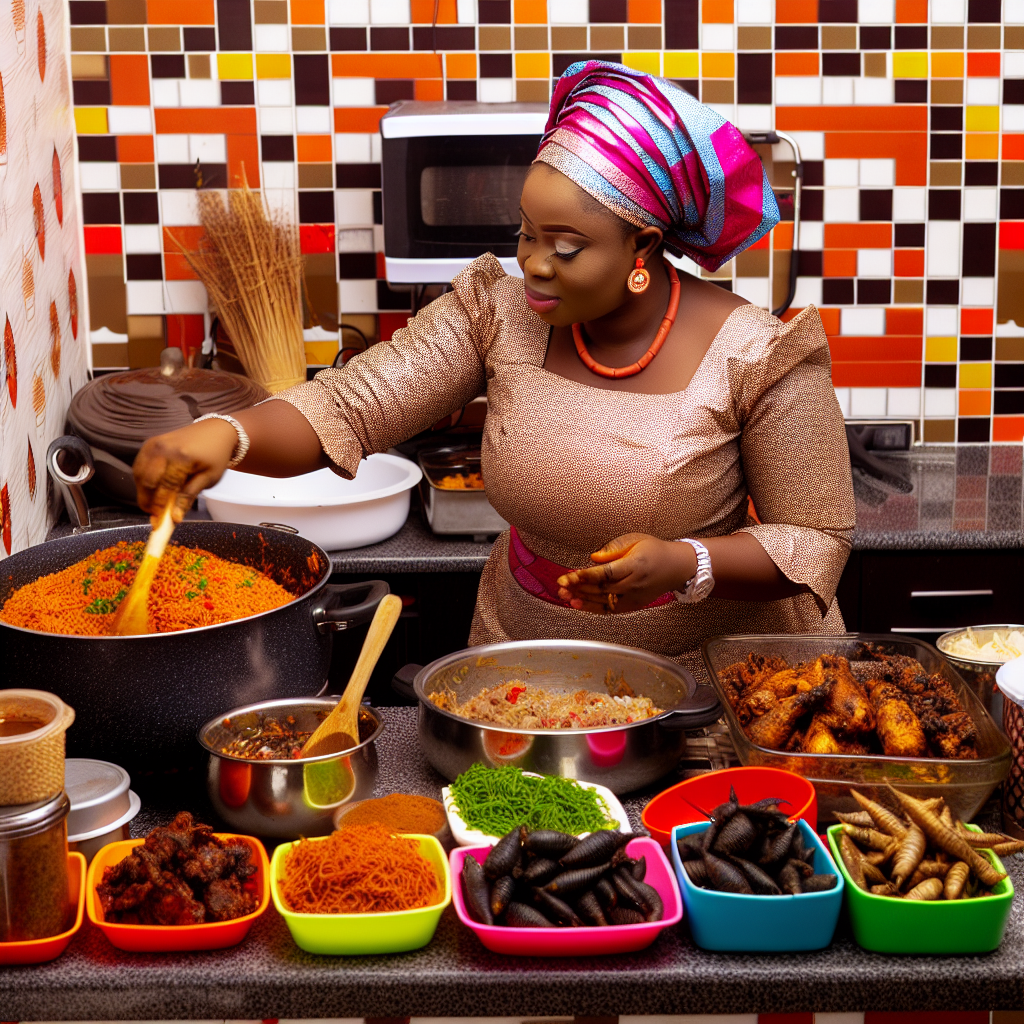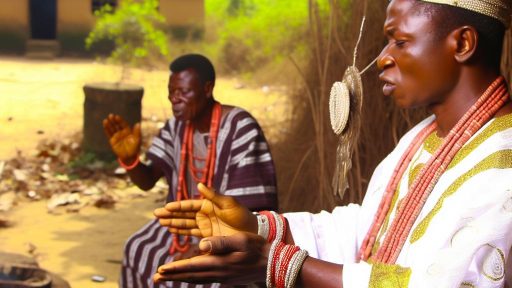Significance of Food in Nigerian Culture and Weddings
Food holds immense significance in Nigerian culture.
It symbolizes unity among families and friends during celebrations.
Nigerian traditional weddings showcase this cultural importance exceptionally well.
During these events, food acts as a bridge between two families.
This social element enhances communal bonds and relationships.
Culinary Diversity
Nigeria boasts a rich tapestry of culinary traditions.
Each ethnic group contributes unique flavors and dishes to the collective cuisine.
For instance, Jollof rice is immensely popular at weddings.
This beloved dish encourages conversations among guests.
Moreover, the variety of dishes represents cultural identity and pride.
Rituals and Symbolism
Food plays a crucial role in wedding rituals.
For example, the sharing of a meal signifies acceptance and unity.
Cakes, especially the elaborate wedding cake, hold significant symbolism.
Cutting the cake together represents the couple’s shared future.
This act also fosters collective joy among guests.
Community Involvement
Food preparation often involves families and community members.
This collaboration fosters a sense of belonging and unity.
Moreover, neighbors offer assistance, making the event a communal effort.
Such involvement builds stronger relationships beyond the wedding day.
Ultimately, food becomes a shared experience that resonates with all.
Overview of Traditional Nigerian Wedding Rituals and Their Communal Aspects
Significance of Traditional Weddings
Traditional Nigerian weddings are vibrant celebrations filled with cultural significance.
These events highlight the unity of families and communities.
Food plays a crucial role during these weddings, serving as a symbol of togetherness.
Key Rituals and Customs
Each traditional wedding features unique rituals that vary by ethnic group.
Common practices include the introduction of families, exchange of gifts, and traditional blessings.
These elements emphasize the importance of relationships among families.
Food is central during these rituals, as it fosters unity and community spirit.
The Role of Food in Celebrations
Culinary offerings are abundant during traditional weddings in Nigeria.
Each dish represents the couple’s heritage and shared values.
Guests gather to enjoy meals together, reinforcing social bonds.
Notably, indigenous dishes like jollof rice and pounded yam are often served.
Importance of Community Involvement
Community members actively participate in wedding preparations.
This involvement strengthens relationships and ensures collective joy.
Sharing food during the ceremonies signifies mutual support and cooperation.
Families often come together to prepare traditional dishes, enhancing unity.
Symbolism of Shared Meals
Shared meals symbolize the merging of two families through marriage.
Guests partaking in the feast experience a sense of belonging.
Delicious food promotes happiness and celebration among attendees.
Moreover, it reflects the abundance of blessings in a new union.
Role of Traditional Dishes in Symbolizing Unity Between Families
Shared Meals as a Symbol of Togetherness
Traditional dishes play a vital role in Nigerian weddings.
They represent a gathering of both families.
During these events, families share meals as a symbol of unity.
Each dish fosters connection and strengthens ties.
Culinary Traditions and Regional Diversity
Nigeria boasts diverse culinary traditions across its regions.
Different regions bring unique flavors to the wedding celebration.
This variety showcases the richness of Nigerian culture.
As families come together, they appreciate these differences.
Symbolic Meaning of Popular Dishes
Certain dishes carry symbolic meanings in Nigerian weddings.
Jollof rice represents hospitality and abundance.
Pounded yam signifies strength and perseverance.
These foods create opportunities for storytelling among families.
Role of Food in Reconciliation
Food serves as a bridge during family reunions.
Weddings allow families to resolve past differences.
Sharing meals fosters forgiveness and mutual respect.
This culinary diplomacy encourages unity among families.
The Importance of Preparation and Participation
Preparation of traditional dishes involves both families.
This collaboration deepens their relationship.
Participating in cooking creates memorable experiences.
It showcases the value of cultural exchange and teamwork.
Uncover the Details: 7 Unique Nigerian Wedding Customs That Are Making a Comeback
Importance of Communal Feasting as a Form of Celebration and Bonding
Cultural Significance of Food in Weddings
In Nigeria, food plays a crucial role during traditional weddings.
It serves as a medium of cultural expression and a symbol of unity.
Families come together to share meals that reflect their heritage.
Each dish tells a story, highlighting unique customs and traditions.
Facilitating Connections
Communal feasting fosters connections among family and friends.
Guests gather around tables, sharing laughter and joy.
This atmosphere strengthens relationships among attendees.
Additionally, it promotes a sense of belonging and togetherness.
The Role of Shared Meals
Shared meals enhance the wedding experience for everyone involved.
They encourage conversation and interaction among guests.
This interaction breaks down barriers and builds new friendships.
Moreover, it deepens existing relationships between families.
Symbol of Prosperity and Abundance
The variety of dishes served symbolizes abundance and prosperity.
Guests enjoy an array of foods that showcase culinary talents.
This diversity reflects the couple’s commitment to each other and their future.
In essence, it represents an optimistic beginning for their life together.
You Might Also Like: Unveiling Unique Yoruba Wedding Customs You Didn’t Know Existed
Types of Traditional Foods Served at Weddings and Their Meanings
Rice Dishes
Jollof rice is a popular choice at Nigerian weddings.
This dish symbolizes abundance and community.
It often brings family and friends together in celebration.
Fried Plantains
Fried plantains are a beloved side dish at celebrations.
They represent sweetness and joy in the union.
Moreover, they complement many main dishes beautifully.
Beans Dishes
Beans porridge, known as “Ewa Riro,” is often served.
It signifies strength and resilience in the marriage.
This dish highlights the importance of support in relationships.
Meat Dishes
Suya, spicy meat skewer, is a crowd favorite.
It symbolizes passion and excitement in the couple’s journey.
This dish also encourages social interaction and enjoyment.
Sauces and Stews
Rich stews like “Ogbono” or “Efo Riro” are essential.
These represent the nurturing aspect of marriage.
They convey care and commitment from both parties.
Local Snacks
Puff-puff and chin chin are often served as appetizers.
These tasty snacks embody joy and lightheartedness.
They invite guests to indulge and enjoy themselves.
Beverages
Traditional drinks, such as palm wine, are common.
This beverage symbolizes joy and celebration in Nigerian culture.
Sharing drinks fosters a sense of unity among attendees.
See Related Content: Discover How Igbo Traditional Weddings Influence Modern Marriage Practices
Examples of Specific Dishes Representing Different Ethnic Groups in Nigeria
Yoruba Cuisine
The Yoruba people celebrate weddings with rich, flavorful dishes.
One popular dish is Jollof rice, known for its vibrant red color.
Jollof rice often features a blend of spices and tomatoes.
It symbolizes the warmth and vibrancy of Yoruba culture.
Another traditional dish is Efo Riro, a delicious spinach stew.
This dish represents unity through communal dining experiences.
Ibo Cuisine
Ibo weddings showcase unique dishes that tell cultural stories.
Ofe Nsala, a white soup made with catfish, is a favorite.
This dish represents the importance of family gatherings.
Rice often accompanies Ofe Nsala, symbolizing abundance.
An equally loved dish is Nkwobi, a spicy cow foot delicacy.
Nkwobi strengthens bonds among the guests at the wedding.
Hausa Cuisine
The Hausa community features delicious, aromatic dishes at weddings.
One popular dish is Jollof rice, infused with specific local spices.
Suya, a spiced meat skewer, is also a wedding staple.
This dish exemplifies the vibrancy of Hausa culinary tradition.
Fura da Nono, a fermented milk drink, represents hospitality.
It helps to cool guests down during warm wedding festivities.
Ijaw Cuisine
Ijaw cuisine also plays a vital role in wedding celebrations.
One significant dish is Banga soup, made from palm nuts.
This dish is traditionally served with different types of starch.
It embodies the rich cultural heritage of the Ijaw people.
Another common dish is Nkwobi, showcasing flavors of the region.
These dishes are often prepared with love and communal effort.
Inter-Ethnic Unity through Food
Dishes from various ethnic groups foster unity during weddings.
Each dish tells a story beyond its ingredients and flavors.
Guests from different backgrounds come together to share meals.
This culinary experience strengthens relationships among families.
Food at weddings becomes a bridge for cultural exchange.
Therefore, unity in diversity is celebrated through traditional dishes.
Explore Further: Exploring Nigeria’s Unique Traditional Wedding Rituals

The Act of Sharing Food as a Metaphor for Strengthening Relationships
Cultural Significance of Food
Food plays a vital role in Nigerian traditional weddings.
It acts as a symbol of unity among families and friends.
Sharing meals fosters connections and builds bonds.
Each dish served tells a story of heritage and community.
Furthermore, it reflects the diversity of Nigerian culture.
The Gathering of Families
A wedding in Nigeria often brings two families together.
Food serves as a focal point during these gatherings.
Guests engage in meaningful conversations over meals.
These interactions break down barriers and promote understanding.
As they eat together, the atmosphere becomes warm and welcoming.
Symbolism of Traditional Dishes
Traditional dishes embody unique cultural meanings.
For instance, jollof rice signifies celebration and joy.
Pounded yam and egusi soup represent prosperity and abundance.
Each dish enhances the significance of the occasion.
Moreover, they connect individuals with their heritage.
Emotional Connections through Food
Sharing food elicits strong emotions during weddings.
It brings back memories of family traditions and gatherings.
These emotional ties strengthen familial relationships.
Guests bond over shared experiences around the dining table.
In essence, food nurtures unity and togetherness.
Impact of Food Presentation and Etiquette on Symbolizing Respect and Unity
Visual Appeal of Food
In Nigerian traditional weddings, food presentation plays a pivotal role.
A beautiful display of dishes captures the guests’ attention effectively.
This aesthetic appeal symbolizes the couple’s respect for their guests.
Guests feel appreciated when served visually appealing meals.
Cultural Significance of Food Choices
Each dish served during these events holds cultural significance.
Popular dishes include jollof rice, pounded yam, and egusi soup.
These dishes showcase the richness of Nigerian culinary heritage.
By offering these foods, families demonstrate unity and cultural pride.
Etiquette and Dining Experience
Proper dining etiquette enhances the overall wedding experience.
Guests expect a formal and respectful dining atmosphere.
Well-set tables and attentive service create a welcoming environment.
This etiquette reinforces the bond between families and guests.
Food as a Communication Tool
Food serves as a universal language during weddings.
It conveys joy, happiness, and a sense of belonging.
Guests bond over shared meals, fostering unity among attendees.
This shared experience strengthens relationships between families.
Food’s Role in Celebrating Culture
Indeed, food transcends physical nourishment at Nigerian weddings.
It represents deep-rooted values of respect and unity.
Ultimately, food acts as a bridge, connecting diverse cultures.
Thus, it plays a fundamental role in strengthening communal ties.
The Enduring Legacy of Food as a Unifying Factor in Nigerian Weddings
Cultural Significance of Food
Food plays a vital role in Nigerian traditional weddings.
It represents the rich cultural heritage of various ethnic groups.
Through shared meals, families come together to celebrate unity.
Moreover, dishes often symbolize abundance and prosperity.
Types of Traditional Dishes
Nigeria boasts a variety of dishes that are integral to weddings.
Jollof rice remains a crowd favorite at any celebration.
Party rice is often brightly colored, attracting guests’ attention.
Pounded yam and egusi soup are also popular main courses.
- Suya is often served as a delicious appetizer.
- Fried plantains add sweet and savory flavors to the meal.
- Bitter leaf soup showcases regional culinary practices.
The Role of Sharing Food
Sharing food creates a bond between families and guests.
As people eat together, they engage in conversations and laughter.
This shared experience fosters camaraderie among attendees.
It symbolizes the merging of two families into one community.
Food and Rituals in Weddings
Certain dishes are part of various wedding rituals.
For instance, the presentation of food signifies abundance.
Traditional ceremonies often feature prayers over the meal.
This spiritual aspect highlights the importance of food in union.
Enduring Influence on Modern Weddings
Modern Nigerian weddings still reflect traditional customs.
Food choices may evolve, but the significance remains strong.
Couples often blend cultural traditions to honor their roots.
Thus, food continues to highlight unity in festivities.
The Connection Between Food and Community
Communities often come together to prepare for weddings.
This collaboration reinforces social ties and local traditions.
Involvement in cooking and serving strengthens community bonds.
Consequently, food becomes a symbol of collective joy and support.
Additional Resources
Unique Wedding Traditions From Around the World – Savvy Bridal
Traditional Nigerian Wedding Customs: The Ultimate Nigerian …




